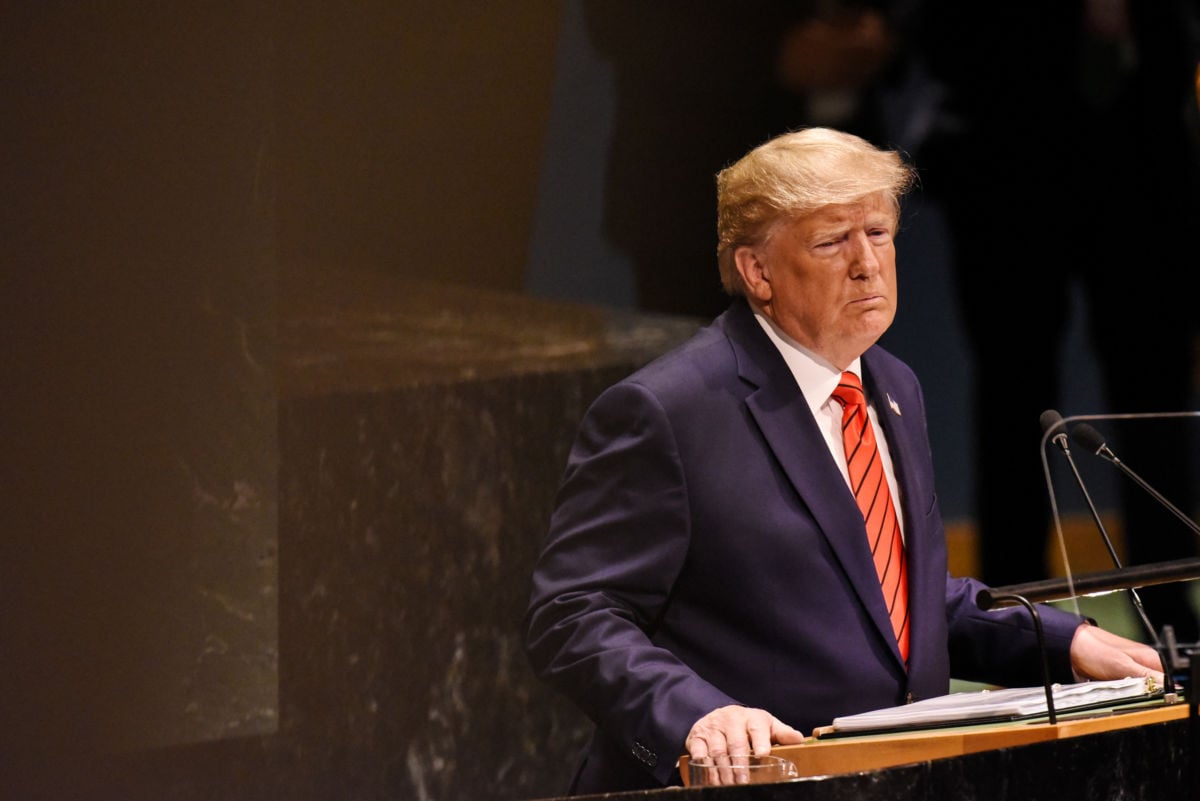Did you know that Truthout is a nonprofit and independently funded by readers like you? If you value what we do, please support our work with a donation.
At the recent United Nations General Assembly meeting, the United States, Israel and the Kingdom of Saudi Arabia seemingly spoke with one voice. Denouncing the recent attacks on Saudi Arabia’s oil facilities, President Trump asserted that “all nations have a duty to act. No responsible government should subsidize Iran’s bloodlust.” Israeli Minister for Foreign Affairs Israel Katz called on “the international community to support President Trump’s maximum pressure policy against Iran.” Saudi Minister for Foreign Affairs Ibrahim bin Abdulaziz bin Abdullah Al-Assaf likewise called on the international community to apply “the utmost pressure” on Iran in response to the attacks.
In considering these appeals, the international community should first note that conclusive evidence that Iran carried out these attacks has yet to be produced. Second, it should consider the track record of “maximum pressure” against Iran, which suggests the strategy simply will not work, and could in fact make things much worse.
For starters, maximum pressure is largely responsible for the current crisis in the Persian Gulf region. When the U.S. unilaterally withdrew from the Iran nuclear deal, the reimposition of sanctions lifted under the agreement put enormous pressure on Iran to respond in kind. Yet rather than withdrawing from the accord, Iran continued abiding by its terms for a full year. Failing to work out an agreement with European nations to bolster Iran’s economy against U.S. sanctions, Iran has now reduced its compliance with some provisions of the accord, though it continues to state its commitment to never developing nuclear weapons.
If Iran is behind any of the recent attacks on oil infrastructure in the region, then these attacks are likely a response to the reimposition of U.S. sanctions — a way of exacting costs on U.S. oil interests just as the U.S. has exacted costs on Iranian oil interests. Doubling down on the maximum pressure campaign only invites further escalation.
Thankfully, there is a better approach, one that’s yielded far better results in the past. After over a decade of punishing sanctions failed to yield positive results, the pivot to steadfast international diplomacy with Iran produced the most comprehensive nuclear agreement ever negotiated. The agreement relieved sanctions on Iran in exchange for the country agreeing to strict limits on its nuclear program and a foolproof international inspections regime to verify its compliance.
Until recently, Iran was in complete compliance, and there is no compelling evidence to suggest it would not have remained in compliance had the U.S. remained loyal to the terms of the deal. Aside from the benefits of the deal itself, the diplomacy that went into it opened the door to further progress in regional and international relations with Iran. For example, when Iran detained 10 U.S. sailors in 2016 for entering Iranian territorial waters, diplomatic channels established during negotiations on the Iran agreement were credited with securing the sailors’ quick release a day later. More broadly, the Iran accord was a testament to the power of diplomacy to resolve seemingly intractable problems and open doors for further progress.
As tensions in the region continue to mount, so do fears that a miscalculation could spark a regional war, and perhaps, given the world energy markets at stake, a global conflagration. Diplomacy is the only viable path to de-escalation, but pursuing real diplomacy under the conditions of maximum pressure is a tall order. Though often characterized as diplomatic tools, sanctions are not diplomacy. They are coercive measures that, in Iran’s case, create economic hardship for an entire population. That hardship in turn undermines domestic support in Iran for diplomacy, making diplomacy a politically challenging choice for Iranian leaders. To change this calculation, the international community should reduce rather than increase economic pressure on Iran, and urgently pursue negotiations to ratchet down tensions.
For the U.S., firing National Security Advisor John Bolton, whose chief goal in the region has seemingly always been regime change in Iran, was a step in the right direction. But peace takes more than an aversion to all-out war; it takes diplomacy, and maximum pressure is keeping real diplomacy just out of reach.
A terrifying moment. We appeal for your support.
In the last weeks, we have witnessed an authoritarian assault on communities in Minnesota and across the nation.
The need for truthful, grassroots reporting is urgent at this cataclysmic historical moment. Yet, Trump-aligned billionaires and other allies have taken over many legacy media outlets — the culmination of a decades-long campaign to place control of the narrative into the hands of the political right.
We refuse to let Trump’s blatant propaganda machine go unchecked. Untethered to corporate ownership or advertisers, Truthout remains fearless in our reporting and our determination to use journalism as a tool for justice.
But we need your help just to fund our basic expenses. Over 80 percent of Truthout’s funding comes from small individual donations from our community of readers, and over a third of our total budget is supported by recurring monthly donors.
Truthout’s fundraiser ended last night, and we fell just short of our goal. But your support still matters immensely. Whether you can make a small monthly donation or a larger one-time gift, Truthout only works with your help.
